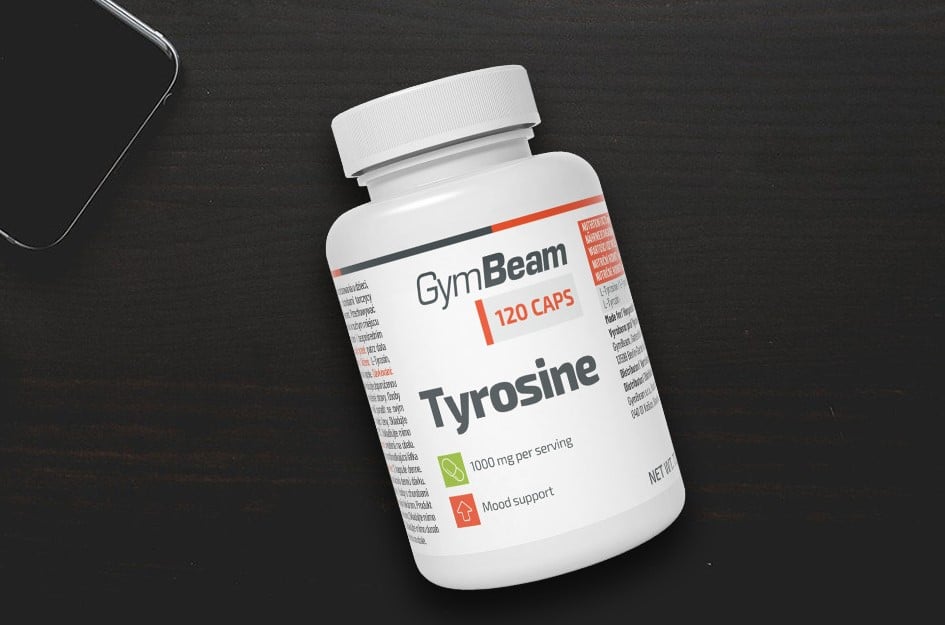Table of Contents
Everyone experiences stress in their life from time to time. During an exam, at work or on a first date waiting for how the meeting will turn out. It is simply part of the human experience.
Since stressful situations are sometimes impossible to avoid, in today’s article we will introduce the amino acid tyrosine. We will discuss its benefits, function in the body, and how its sufficient supply can help better manage the situations mentioned in the introduction.

What is tyrosine?
Tyrosine is a non-essential amino acid, which means that, unlike essential ones, it can be synthesized from another amino acid. Its sufficient level has a positive effect on vitality, concentration, and it contributes to normal muscle function. The amino acid L-tyrosine is present in many foods and is metabolized to produce catecholamines such as dopamine, epinephrine (adrenaline) and norepinephrine (noradrenaline). [1–2]
Adrenaline and noradrenaline are stress hormones that are released mainly in stressful situations. They increase the heart rate and blood sugar level. They are responsible for behaviour under stress and cause a noticeable increase in strength.
Dopamine is an important neurotransmitter produced in the brain. It functions as a messenger of the nervous system that transmits chemical information and influences human behavior – motivation, concentration and mood. In certain parts of the brain, dopamine is released mainly during naturally pleasurable activities, such as sex, physical activity or gym workout.

Tyrosine is also part of the process of producing thyroid hormones, which are primarily responsible for regulating metabolism and melanin, a pigment that adds colour to the skin, hair and eyes. The highest concentration of tyrosine occurs mainly in the intestinal mucosa. It is usually produced only if there is a sufficiency of other amino acid in the body – phenylalanine. [3–5]
Phenylalanine is an essential amino acid that is, within metabolism, an important precursor for production of tyrosine. As a compound, it serves to produce neurotransmitters needed for the activity of the nervous system. There are two forms of phenylalanine:
- D-phenylalanine, which is not an essential amino acid
- L-phenylalanine, which is found in proteins. It is important for the production of tyrosine.
What is phenylketonuria (PKU)?
You have probably never heard of this term, but the name suggests that it is related to phenylalanine. We mentioned that phenylalanine is converted tyrosine only if there is enough of it in the body.
However, some people have inherited inability to process this essential amino acid. Phenylketonuria or phenylketonuric oligophrenia is a genetic disorder of phenylalanine metabolism. It is one of the most common inherited metabolic diseases, the treatment of which must begin before the third month of the child’s age. Unrecognized phenylketonuria can manifest as mental retardation, seizures, excessive muscle tension, and hyperactivity.
Patients with this disorder tend to have low levels of tyrosine in their bodies because they need to follow a diet low in phenylalanine. Other potential problems associated with phenylketonuria include vitamin D and B12 deficiency, and also deficiency of calcium and iron, which is why it is important to use nutritional supplements. [6]
You might be interested in these products:
Discovery of tyrosine
An interesting story is connected with the discovery of tyrosine. Its influence and effects on the human body were first discovered more than four decades ago by the British pharmacist Tony Hunter, whose wife was taking antidepressants. He noticed that every time she ate cheese, especially a fast ripening type, she had a severe headache. The cheese and especially the fast-ripening one, has been found to contain large amounts of tyrosine.Thus, tyrosine comes from the Greek word “Tyros”, meaning cheese. [4]
Consequently, tyrosine-containing products are nowadays not recommended for people taking antidepressants. According to studies, tyrosine can induce hypertension in people suffering from depression within two hours. [7]

The main sources of tyrosine
The body can produce this non-essential amino acid on its own, but to have its sufficient levels, you need to focus especially on foods high in protein.The perfect source of tyrosine is plant or animal protein in the following products:
- cheese
- eggs
- chicken and turkey meat
- soy
- almonds or nuts
However, some fruits also contain tyrosine, mainly avocado and banana. [8]
A varied diet rich in protein should provide sufficient amount of tyrosine. However, tyrosine in the form of a nutritional supplement can also help its ideal levels in the body.
The effects of tyrosine
The results of the studies suggest that tyrosine may have a relatively wide range of effects. Some presumed effects on the human body have not been confirmed at all. Others suggest that tyrosine can help with endurance training, memory retention, and attention.
1. Tyrosine vs. endurance exercise
There was an interesting study with eight healthy volunteers who performed exercises on bicycles for one week. Participants were divided into two groups. The subjects of the first group consumed 0.5 liters of a sugar-free placebo drink before training at an outdoor temperature of 30 degrees Celsius, the other group consumed 150 mg of tyrosine in their drinks. The results of the study showed that the group with tyrosine cycled a little longer and their body was able to cope better with the demanding temperatures. [9]
2. Tyrosine vs. working memory and attention
In another comprehensive study, they observed people who had been exposed to cold for four and a half hours and had their oxygen supply restricted.At lower temperatures and hypoxia, tyrosine has been shown to reduce a number of adverse behavioural effects such as headache, cold, fear or fatigue compared to placebo. Although these results cannot be considered unambiguous and further research is needed, it seems that tyrosine can also help maintain working memory and attention. [10]
Does tyrosine help with weight loss?
This question has been asked by many who would like to simplify or speed up the weight loss process. To better understand how tyrosine works in the body, remember that tyrosine affects optimal levels of the hormones in the body that can help burn fat.
Phenylalanine is first converted through a chemical process to tyrosine, and later to another amino acid called L-DOPA (levodopa). It is then converted to the neurotransmitter dopamine, which produces adrenaline and noradrenaline. These two hormones that play an important role in the diet.Adrenaline and noradrenaline are involved in lipolysis and fat mobilization. At the same time, they are part of the “heat production” – thermogenesis and ketogenesis, which is the process of dividing adipose tissue. [17]
Thus, given that tyrosine is a precursor of dopamine, adrenaline and noradrenaline, we can say that optimal tyrosine levels can help burn fat. In any case, there are no clinical studies to confirm the effects of tyrosine on weight loss. If you want to kick-start your body in the fight against fa twith exercise, we recommend the following article: 12 best tips for home cardio training.
How does tyrosine relate to stress or depression?
Stress leads to a lower concentration of important transmitters. Several studies have focused on how tyrosine can help reduce stress. These showed a positive correlation between the supplementation tyrosine and increased mental performance. [11]
Men who underwent intensive combat training in stressful situations performed better after drinking a protein drink containing ten grams of tyrosine.Their memory improved and their blood pressure was optimal. In women, tyrosine significantly improved working memory during a mentally demanding task compared to placebo. [11]

What does this mean? Adequate intake of tyrosine through diet or supplements can reduce fatigue and stress, and thus improve cognitive function.It can help the body to be able to better switch between tasks, which is called cognitive flexibility. [11–13]
Tyrosine and depression
First of all, it should be borne in mind that while stress is usually a matter of time, depression has a longer-term nature. It is a mental condition that requires professional help. Common symptoms of depression are sleep problems, impaired memory, also fatigue, overeating, or even anorexia.
Depression is one of the most common mental illnesses that can eventually lead to death. Although its underlying pathophysiology is not clearly defined, preclinical and clinical evidence suggests disorders of serotonin, norepinephrine and dopamine neurotransmission in the central nervous system. Tyrosine helps to optimally produce neurotransmitters and can thus function as an antidepressant. [18]
Experiments with depressed patients suggest that tyrosine may increase norepinephrine levels in the brain. However, depression is a complex and diverse mental disorder, so unlike stress, it is not yet scientifically confirmed whether tyrosine helps with depression. [14]
How to take tyrosine?
Tyrosine is usually taken in doses of 500-2000 mg approximately 30-60 minutes before any activity in which the body is exposed to stress, such as training. The recommended dose is in the range of 100-150 mg / kg of body weight. Therefore, for people weighing 90 kg, it is recommended to take 9-13.5 g of tyrosine one hour before training, and 7-10 g of tyrosine for people with 70 kg. Doses can also be divided into two parts, 30 and 60 minutes before exercise. [15]
Does tyrosine have side effects?
Since it is one of the essential non-essential amino acids, tyrosine is generally considered safe. However, as mentioned in the introduction, tyrosine is a precursor of catecholamines (stimulating hormones), it can interact or strengthen the effects of other stimulants or drugs that affect the production of dopamine and norepinephrine, such as levodopa (L-DOPA).
In particular, it is not recommended for people taking MAOI antidepressants (monoamine oxidase inhibitors). It can cause a hypertensive crisis – a sudden and sharp rise in blood pressure. It is also not recommended for people with thyroid problems. [16-17]
Our nervous system is more or less exposed to stress. Tyrosine is a non-essential amino acid that our body needs at this hectic time. It contributes to the production of key neurotransmitters that help regulate mood and emotional stability. The results of studies show that tyrosine helps to improve concentration not only in physical but also in mental performance. Tyrosine is one of the less studied amino acids, but it seems that its effects can help athletes and active people achieve their goal.
You may not have heard much about tyrosine yet, but we believe that this article has brought you all the important information about it. If you want your friends to know about tyrosine, support us by sharing the article.
[1] Van de Walle G. - Tyrosine: Benefits, Side Effects and Dosage – https://www.healthline.com/nutrition/tyrosine
[2] Paravati S., and col. - Physiology, Catecholamines – https://www.ncbi.nlm.nih.gov/books/NBK507716/
[3] National Library of medicine - Tyrosine – https://pubchem.ncbi.nlm.nih.gov/compound/tyrosine
[4] Arnst J., - A legacy of tyrosine – https://www.asbmb.org/asbmb-today/people/051120/a-legacy-of-tyrosine
[5] Mitchel J. J., and col. - Phenylalanine hydroxylase deficiency – https://www.nature.com/articles/gim2011114
[6] Al Hafid N., - Phenylketonuria: a review of current and future treatments – https://www.ncbi.nlm.nih.gov/pmc/articles/PMC4728993/
[7] Kandula P., Agarwal R. - Proteinuria and hypertension with tyrosine kinase inhibitors – https://www.kidney-international.org/article/S0085-2538(15)54996-X/fulltext
[8] Ristic A. - 8 Potential L-Tyrosine Benefits + Dosage & Side Effects – https://selfhacked.com/blog/tyrosine-6-proven-health-benefits-tyrosine/
[9] Tumilty L., and col. - Oral tyrosine supplementation improves exercise capacity in the heat – https://pubmed.ncbi.nlm.nih.gov/21437603/
[10] Mullur R., and col. - Thyroid Hormone Regulation of Metabolism – https://www.ncbi.nlm.nih.gov/pmc/articles/PMC4044302/
[11] Young S., - L-Tyrosine to alleviate the effects of stress? – https://www.ncbi.nlm.nih.gov/pmc/articles/PMC1863555/
[12] Banderet L., Lieberman H., - Treatment with Tyrosine, a Neurotransmitter Precursor, Reduces Environmental Stress in Humans – https://sci-hub.se/https://pubmed.ncbi.nlm.nih.gov/2736402/
[13] Attipoe S., and col - Tyrosine for Mitigating Stress and Enhancing Performance in Healthy Adult Humans, a Rapid Evidence Assessment of the Literature – https://academic.oup.com/milmed/article/180/7/754/4160625
[14] Gelenberg A., and col. - Tyrosine for depression: a double-blind trial – https://pubmed.ncbi.nlm.nih.gov/2142699/
[15] Jongkees B. J., and col. - Effect of tyrosine supplementation on clinical and healthy populations under stress or cognitive demands—A review – https://www.sciencedirect.com/science/article/abs/pii/S0022395615002472?via%3Dihub
[16] Zaragoza J., and col. - Effects of acute caffeine, theanine and tyrosine supplementation on mental and physical performance in athletes – https://jissn.biomedcentral.com/articles/10.1186/s12970-019-0326-3
[17] Al Hafid N., - Phenylketonuria: a review of current and future treatments – https://www.ncbi.nlm.nih.gov/pmc/articles/PMC4728993/
[18] Moret Ch., Briley M. - The importance of norepinephrine in depression – https://www.ncbi.nlm.nih.gov/pmc/articles/PMC3131098/


Add a comment